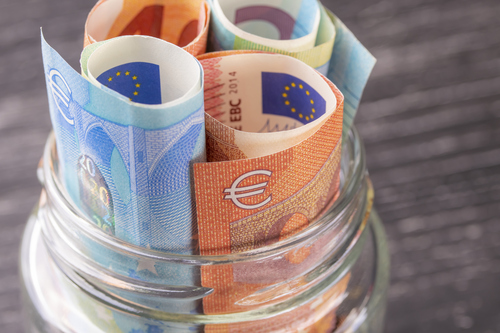Une épargne record au mois d’avril
En mars, le Livret A avait déjà enregistré un niveau de collecte record, avec 2,71 milliards d’euros. Le confinement, qui a débuté le 17 mars, n’est bien sûr pas étranger à ce phénomène. Au mois d’avril, premier mois complet de confinement, le taux d’épargne a explosé avec une collecte du Livret A de près de 5,5 milliards d’euros. Si on y ajoute le LDDS, la collecte atteint 7,39 milliards d’euros pour le seul mois d’avril, un record mensuel depuis janvier 2013, record qui s’expliquait alors par le relèvement du plafond des livrets d’épargne.
Au total, le livret A et le LDDS ont déjà dépassé, à ce stade de l’année, la collecte totale de l’année 2019, et leur encours total au 30 avril est de 428,2 milliards d’euros.
D’une manière générale, les dépôts en zone euro ont été multipliés par trois au mois de mars et ont atteint les 20 milliards d’euros, contre 6 milliards à la même période en 2019. Le phénomène n’est donc pas spécifique à la France et s’observe dans plusieurs pays de la zone euro, comme l’Espagne ou l’Italie, à l’exception toutefois de l’Allemagne qui a observé une décollecte de 10 milliards d’euros en mars sur les dépôts.
En revanche, les placements sur les assurances-vie ont nettement diminué, avec une décollecte de 2,2 milliards d’euros.
Comment expliquer ce phénomène ?
Tout d’abord, le confinement a réduit concrètement et matériellement les possibilités de consommation. Si les achats en ligne se sont en partie substitués aux achats en magasins, les difficultés de livraison et la crainte des contacts ont considérablement réduit les dépenses.
Ensuite, l’incertitude et la crise économique naissante ont conduit les ménages à faire preuve de prudence. Peur du lendemain, du chômage massif, de la dette à rembourser : la période n’est guère propice aux dépenses.
Par ailleurs, l’instabilité des marchés financiers explique la décollecte observée sur les produits d’assurances-vie. Une partie des sommes déposées sur les assurances-vie étant placées en actions, les Français ont préféré se tourner vers une épargne sûre, bien que faiblement rémunérée, comme le Livret A.
Dans un entretien accordé au journal Les Echos, Philippe Crevel, directeur du Cercle de l’Épargne, souligne que le confinement et la crise du coronavirus n’expliquent toutefois pas à eux seuls cette tendance à l’épargne : « Nous sommes certes dans un moment atypique, exceptionnel. Mais plusieurs facteurs structurels comme le vieillissement de la population ou l’augmentation de la précarité incitent les Français à conserver plus de liquidités qu’auparavant. »
Interrogé sur l’intérêt d’une éventuelle taxation de l’épargne, il affirme qu’elle serait « contre-productive » et conduirait les ménages à conserver leur épargne sur leurs comptes courants ou tout simplement à la maison, en argent liquide.
Les Français vont-ils continuer à épargner ?
La consommation étant l’un des piliers de la croissance, les responsables politiques aimeraient que les Français épargnent moins. Tout l’enjeu politique du déconfinement est de trouver un équilibre fragile entre les précautions sanitaires et la relance de l’économie, notamment via le tourisme en juillet et août.
Éric Lombard, directeur général de la Caisse des Dépôts et consignations (CDC), juge cette épargne excessive. Quant à Bruno Le Maire, le ministre de l’Économie, il avait déclaré en avril devant la Commission des finances de l’Assemblée nationale : « Ce n’est pas d’épargne dont nous avons besoin aujourd’hui pour notre économie, mais d’investissement. »
Toutefois, la diminution de l’épargne et la reprise de la consommation risquent d’être très progressives face à un avenir plus qu’incertain. Les vacances d’été seront le premier indicateur de la tendance des mois à venir, et montreront si les ménages français sont prêts ou non à sortir du principe actuel de prudence.
